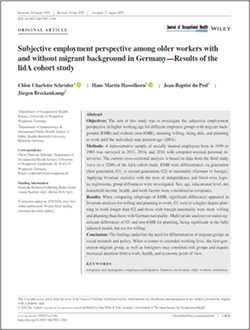#0079 Subjective employment perspective among older workers with and without migrant background in Germany—Results of the lidA cohort study

First-generation migrants more likely to plan for extended working lives than their children are
Faced with aging populations and workforces, European countries such as Germany have raised official pension ages to encourage longer working lives. The existing research into planned and actual retirement ages for German workers has largely ignored the experiences of those with migrant backgrounds, and research into this population is often difficult due its heterogeneous nature, with first- and second-generation migrants differing in terms of types of occupation and their risks of adverse health outcomes that could force early retirement. We hypothesized that such differences between first- and second-generation migrants are relevant to a person’s willingness, ability, and intention to continue working until the official pension age.
To test this hypothesis, we analyzed data from older adult members of the German workforce who participated in the “leben in der Arbeit” cohort, which follows people born in 1959 or 1965. We focused on survey responses collected in 2018 from 3,286 people employed in blue- or white-collar occupations, including 346 first-generation migrants, 236 second-generation migrants, and 2,703 persons of nonmigrant backgrounds. We compared these three groups in terms of willingness, ability, and intentions to continue working until their state pension ages. We also conducted similar comparisons of the first- and second-generation migrants who had German nationality and those who did not.
Compared with the workers of nonmigrant backgrounds, those with migrant backgrounds were just as willing and able to continue working until pension age and planned to do so just as frequently. However, comparisons of the first- and second-generation migrants showed that the first-generation migrants were more likely to intend to work until pension age. Furthermore, migrants without German nationality were more likely to be willing and planning to work until pension age than migrants with German nationality were.
Our findings underscore the importance of considering different migrant subgroups when conducting social research and have significant policy implications. Given that, on average, first-generation migrants have lower education levels, lower household incomes, poorer physical health, and greater exposure to physically demanding work than workers of nonmigrant backgrounds do, their plans to continue working until pension age may stem from necessity rather than a genuine choice. Therefore, policies that promote work quality and job security for migrant workers should be made a priority.

Link to the original journal article:
https://onlinelibrary.wiley.com/doi/10.1002/1348-9585.12166
Title of the paper:
Subjective employment perspective among older workers with and without migrant background in Germany—Results of the lidA cohort study
Authors:
Chloé Charlotte Schröder, Hans Martin Hasselhorn, Jean-Baptist du Prel, and Jürgen Breckenkamp




